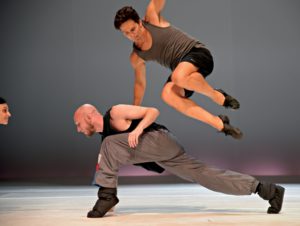Guillaume Côté at Quebec’s Festival des Arts de Saint-Sauveur
- Home
- Reviews 2014 - 2019
- Guillaume Côté at Quebec’s Festival des Arts de Saint-Sauveur

by Philip Szporer
You know you’ve “made it” in Quebec when you’re invited to be a guest on the entertaining Radio-Canada talk show, Tout le monde en parle. It’s Sunday mass for the masses, without the religion. More than a million viewers can’t be wrong. Last March, dancer-choreographer Guillaume Côté, one of Canada’s biggest ballet stars, was on the show. He has soared in leading roles at the National Ballet of Canada, but was sadly unknown in his home province. That one appearance changed all that. I’m told by his public relations team that tickets to Côté’s Crypto, which premiered in July at the Festival des Arts de Saint-Sauveur (FASS), where he is artistic director, sold out minutes after the show aired, and a second evening was added.
A native of Lac-à-la-Croix, in the Saguenay-Lac-Saint-Jean region, Côté’s initial training came when his parents opened a ballet school in his hometown. At age 11, he auditioned and was accepted into the summer program at Canada’s National Ballet School in Toronto, and then, in 1998, into the full-time program. Speaking no English, Côté nonetheless found his footing within a few months. That self-assurance has propelled him on a trajectory nothing less than starry. After a brief stint at New York City Ballet, he returned to Toronto and joined the National Ballet of Canada as a corps de ballet member, becoming principal dancer in 2004 and choreographic associate in 2013. National Ballet artistic director Karen Kain, in a Global News report, called him “enormously gifted. He’s a technical dancer, he’s an emotional dancer, he’s a very musical dancer. He gives everything he’s got.”
Côté, now in his late 30s, is an in-demand guest artist, performing with American Ballet Theatre, English National Ballet and, last December, at the Bolshoi. He’s an athletic and elegant dancer, dramatic and charismatic, perfectly suited to dancing heroic, princely classical roles like Prince Charming, Romeo and Hamlet, but also the troubled Nijinsky and the romantic Knave of Hearts.
Côté’s appointment to the director’s role at FASS came in 2015, succeeding former ballerina Anik Bissonnette. Along with his executive director Etienne Lavigne, a National Ballet principal character artist, Côté has found his footing and understands the immense opportunity of presenting shows in a relatively intimate, air-conditioned tent that seats 450 (the festival’s mainstage venue). Côté and Lavigne quickly realized that a summer festival needs to harness grassroots popularity, and fickle festivalgoers aren’t looking for an opera-house experience. Yet, Côté has chosen a risky path in boosting the festival’s dance content, along with its arguably more popular musical offerings, and extended opportunities to younger companies and artists, alongside established groups.
Watching Côté onstage at FASS, greeting audiences with his curtain speech banter (except at his own show where Lavigne stepped in), is eye-opening. Dapper in a suit and crisp shirt, the fluently bilingual Côté is affable and knowledgeable, unafraid to have crib notes in hand. It’s clear from his commentary that he’s deepened and broadened his knowledge of dance. When he loses his thought, and reflexively smiles broadly, the audience swoons. And, taking a page from the Ted Shawn/Jacob’s Pillow model, wearing many hats, Côté hosts the festival’s post-performance discussions, too.
His 75-minute ballet Crypto, based on Pulitzer Prize-winning librettist Royce Vavrek’s sci-fi fairy tale about beauty, domesticity and the impact of altering the natural, had only an avant-premiere at the festival. It boasted a spellbinding and powerful Drew Jacoby as the androgynous creature, and the immersive wonder of the sophisticated multimedia production design by HUB Studio (Thomas Payette and Mylène Chabrol). Still, the interplay of the technology and the dancing body needs to be mastered, so that viewers are affected by, and not just aware of, the set design and video elements. Nor is it clear why Côté is constantly supporting Jacoby in the partnering, when she is the more dominant character, clearly able to manoeuvre in the world on her own.
The work-in-progress will undoubtedly be developed before its full debut in April 2020 as part of Montreal’s Danse Danse series. As it was, the FASS audience roared with a sustained standing ovation. In no small measure, Côté’s charming presence, not to mention his technically strong dancing, assured that reaction.
DI WINTER 2019

Photo: Jean-François Dessacs
